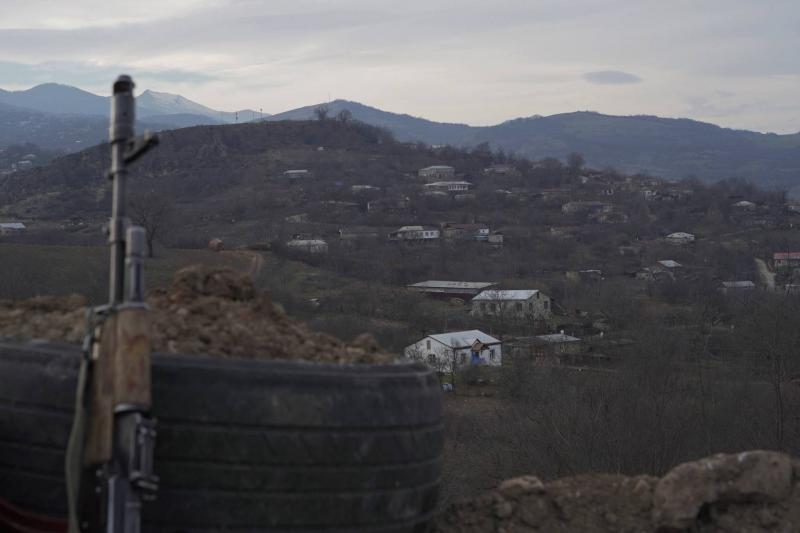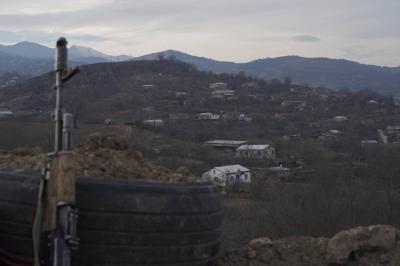The Armenian separatist forces in Nagorno-Karabakh announced on Wednesday their acceptance of a ceasefire proposed by Russian peacekeeping forces, following a series of setbacks on the battlefield at the hands of the Azerbaijan army. They stated, "The ceasefire agreement, which will take effect at 13:00 local time today, means the disbandment of separatist forces and the withdrawal of their weapons." The statement added that discussions regarding the future of the region and its ethnic Armenian population would take place on Thursday, involving representatives from both the local population and the Azerbaijani authorities.
In response, Azerbaijan has requested the peaceful integration of ethnic Armenians in the region after winning the surrender of the defending forces in a 24-hour operation. The Azerbaijani Defense Ministry confirmed that an agreement on a ceasefire has been reached with the ethnic Armenian forces in Nagorno-Karabakh, stating, "The Armenian forces in the mountainous region have agreed to lay down their arms, abandon combat positions and military sites, and disarm completely," with all arms and heavy equipment being handed over to the Azerbaijani army.
Thousands of Armenians gathered at the region’s airport on Wednesday, where some Russian peacekeeping forces are stationed, following the separatists' agreement to a ceasefire that will result in their surrender to Azerbaijan. The separatists, who refer to the territory as the Republic of Artsakh, urged the population of around 120,000 not to rush to the airport in the capital, Stepanakert, for evacuation. They advised, "We again urge the residents of Stepanakert not to succumb to panic and not to head to the airport on their own initiative for evacuation."
Images showed crowds of thousands at the airport, some accompanied by children. Separatist leaders have repeatedly accused Azerbaijan of wanting to carry out ethnic cleansing. Baku denies these accusations, stating it will protect the rights of Armenian civilians in the region under its constitution. The ceasefire agreement includes a meeting between representatives of Armenians in the region and Azerbaijani authorities on Thursday.
Meanwhile, the Russian news agency Interfax reported Armenian Prime Minister Nikol Pashinyan stating that Yerevan was not involved in drafting the ceasefire text. He mentioned that authorities in Karabakh informed his office of their decision to accept a ceasefire, emphasizing that "Armenia has not had troops in Karabakh since August 2021."
Earlier on the same day, Azerbaijan indicated that its military operation in Nagorno-Karabakh, controlled by Armenia, was continuing successfully, despite calls from the United States for an end to hostilities and from Moscow urging both sides to stop the bloodshed in the disputed area. The Azerbaijani Defense Ministry released a statement via Telegram indicating that military operations were "continuing successfully, as weapons and military equipment were destroyed."
Roben Vardanyan, the former head of the separatist government, reported to Reuters that "about 100 people have been killed and hundreds more injured in the separatist region," following Azerbaijan’s initiation of what it described as a "major war." He added, "This is essentially an ethnic cleansing operation," while Moscow called on both sides earlier in the day to halt the bloodshed and return to the implementation of the ceasefire agreement reached in 2020.
The Russian Defense Ministry stated, "Russian peacekeeping forces continue their work in the Nagorno-Karabakh region, providing all possible assistance to civilians and maintaining close communication with all parties." It added that "there are currently 2,116 civilians, including 1,049 children, at the main base of peacekeeping forces."
U.S. Secretary of State Antony Blinken contacted both Azerbaijani President Ilham Aliyev and Armenian Prime Minister Nikol Pashinyan, urging Azerbaijan to "immediately cease military operations and ease the situation." During his call with Pashinyan, Blinken affirmed that "Armenia has the full support of Washington."
Armenia controlled vast areas of Nagorno-Karabakh following a war that erupted after the collapse of the Soviet Union. Azerbaijan regained most of it during a six-week conflict in 2020, which ended with a Russian-mediated ceasefire agreement. The mountainous region of Karabakh is internationally recognized as part of Azerbaijan, though a portion is administered by ethnic Armenian authorities who claim the area as their ancestral homeland.




